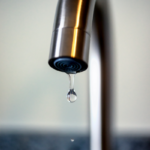Unexpected High Water Bill: How You Can Prevent it
When it comes to moving into a new home or apartment, your water bill most likely is not at the front of your mind. Don’t worry, though, you’re not alone in this. There is a lot to renting and owning a new place without needing to worry about your water consumption right off the bat. Once you are settled however, it is important to take a look at how much water you use in a month and, if you are shocked by the high number on the bill, see what you can do to save yourself both water and money. Here are a few common causes of high water bills and what you can do to fix some of these issues.
A Leaky Toilet, Faucets and Valves
If your toilet is constantly making noise or you hear water dripping from your faucets all day long, this could be what is driving up your water bill. Luckily, these are often easy to fix without needing to call the maintenance line. The most common sources of a leaking faucet – a worn out washer or gasket, a loose O ring, corrosion in the valve seat – can be found and easily replaced with most faucet repair kits. Damaged or deteriorated faucet parts are the leading cause of leaks in bathroom, shower and kitchen faucets, especially if you have an older one in your home or apartment. Always remember to shut off the water in your unit before you start taking any pieces off of your water fixtures, though.
Seasonal Water Consumption
Did you know that the average American home uses roughly 260 gallons of water per day? This number can change depending on the time of year, though, going up to 1,000 gallons or even 3,000 gallons per day in the summer. This is more than 10 times the average daily use and equal to running a garden hose for nearly 8 hours or enough water to supply the same home for sixteen days! Try to be conscious of how much water you and your family is using during the warmer months, as it will most likely be much more than the colder months even though it may not feel like your habits have changed at all. Try to save water whenever possible.
Water Softeners with High Recharge Rates
If you live in an apartment complex, you may not have much of a say in what water softener is used, but if you do, it pays to do your research. The way that water softeners work is by a process of ion exchange where hard water is passed over a bed of resin, which captures the hardness-causing calcium and magnesium ions. Over time, the resin becomes saturated and must be recharged or regenerated. Salt is used to accomplish this process of removing the minerals from the resin. This cycle refreshes your water softener so it can continue working as efficiently as possible. If your water softener does this too often, it will quickly add up, as it can take 35 to 65 gallons of water to regenerate completely. Cutting down on this is one way that you can save yourself water and money.
Furnace Humidifier
If your furnace humidifier is set at too high of a setting, you might be wasting water without even knowing it. This will probably be a greater factor in the winter than the summer, as the cold dry air can quickly dry out your skin and make your home uncomfortable. Play around with the settings on your humidifier to find a good middle ground between running it on such a high setting that you are wasting a lot of water and keeping it so low that it causes health issues.
Old and Leaky Water Heaters
If your water bills have suddenly spiked, you may be dealing with a leaky water heater. If you suspect you might be up against a leak like this, check both the top and the bottom of your water heater. At the top, the leak might be where the water is entering and leaving the tank. Because of the high pressure of the water moving through this part, it’s common for the tubes to lose their seal and leak. At the bottom of your water heater, check the drain valve. Luckily, if this is the culprit, the fix is pretty simple. All you have to do is replace the drain valve. If you are seeing these issues and have an older water heater, though, it might be best to replace the entire thing.
Old and Inefficient Appliances
Old appliances are another big consumer of both water and money in your home. Even though replacing your dishwasher and washing machines with newer, more energy and water efficient models may seem expensive on the surface, these new machines will save you tons of money in the long run. When you are researching new appliances, keep an eye out for ENERGY STAR certifications. On average, a new ENERGY STAR certified dishwasher will save you over 3,870 gallons of water during its lifetime, and will cost you about $35 a year to run. This not only saves you money, but helps the environment as well.
Pipe Leaks
Another place where you might find a leak is in your pipes. This will be trickier to find if the pipe in question is underground. This is a situation where it’s best to call a professional if you aren’t an experienced plumber, as you don’t want to break anything else in the process. If you live in an apartment complex, you might not even have access to the broken pipe, so leave it for maintenance to fix. When you notice your water bill shooting up, it’s a good idea to call your building so that they can take care of this issue before it costs you too much stress and money.

